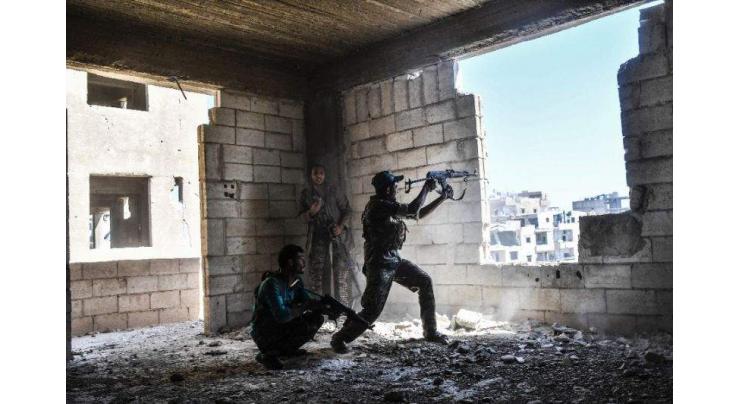
The Battle For Raqa
Fahad Shabbir (@FahadShabbir) Published October 16, 2018 | 05:39 PM

On October 17, 2017, a US-backed Arab-Kurdish coalition captured the city of Raqa in northern Syria from Islamic State group jihadists who had made it their de facto capital.
Beirut, (APP - UrduPoint / Pakistan Point News - 16th Oct, 2018 ) :On October 17, 2017, a US-backed Arab-Kurdish coalition captured the city of Raqa in northern Syria from Islamic State group jihadists who had made it their de facto capital.
Here is a timeline: - 'Wrath of the Euphrates' - On November 5, 2016, the US-backed Syrian Democratic Forces launches an offensive dubbed "Wrath of the Euphrates" to take Raqa, which has been in IS hands since early 2014.
The SDF, a Syrian anti-IS coalition dominated by the Syrian Kurdish People's Protection Units (YPG), are 30,000-strong.
The first phase consists in isolating Raqa, cutting its main links with the outside world.
- American armoured vehicles - In January 2017, the SDF says the US has delivered to it armoured vehicles, which US officials stress have gone to certain Arab units.
NATO member Turkey opposes the Kurdish YPG because it fears the group could push for a Kurdish homeland incorporating Turkish territory.
In March SDF troops backed by international aircraft cut the main supply route between Raqa and Deir Ezzor province to the east.
Later that month the Pentagon announces US troops, artillery and helicopters have backed an SDF operation to seize the strategic Tabqa hydroelectric dam, around 50 kilometres (30 miles) west of Raqa. For the first time members of the SDF have been carried by helicopter behind jihadist lines.
On May 10, the SDF seizes Tabqa and the dam on the Euphrates.
In late May the Pentagon says it has started to deliver weapons to the SDF's Kurdish units.
- SDF enters Raqa - On June 6, the SDF enters Raqa for the first time, the start of the battle for the city.
On June 18 a US fighter jet shoots down a Syrian military plane accused of bombarding the SDF. Clashes take place between regime troops and SDF fighters to the south of the city.
In early July the Arab-Kurdish coalition penetrates Raqa from the south, crossing the Euphrates. The US army says American military advisers are operating within Raqa.
In August Amnesty International says civilians in Raqa are under fire "from all sides".
- Raqa freed from IS - On September 1, the SDF say they have routed IS jihadists from the Old City, bringing them closer than ever to the jihadist bastion's well-defended and densely populated heart.
The SDF and US special forces tighten the noose around the last pockets of resistance, but landmines hinder operations.
On October 16, the SDF takes the infamous Al-Naim traffic circle, dubbed the "Roundabout of Hell" by residents under IS rule because jihadists used it for public beheadings and crucifixions.
After ousting IS fighters from their final holdouts at the state hospital and municipal stadium, the SDF on October 17 declares it has "taken full control of Raqa".
On November 30 the US-led coalition says over 400 US Marines involved in battling the Islamic State group in Syria are being withdrawn after the capture of Raqa, and would not be replaced.
Some 2,000 US soldiers have been deployed in northern Syria, mainly special forces.
- 'In ruins' - In April, the UN says it has conducted its first humanitarian mission to Raqa since its liberation, warning that returning civilians face enormous risks, as it is littered with unexploded devices.
In June Amnesty International says the US-led military campaign killed hundreds of civilians in indiscriminate bombing, amounting to possible war crimes.
In July Human Rights Watch says Raqa has "at least nine mass graves, each one estimated to have dozens, if not hundreds, of bodies, making exhumations a monumental task".
On October 12, Amnesty International says the destruction of Raqa was "shocking" and thousands of bodies have yet to be exhumed.
"Eighty percent of the city is basically in ruins and that applies to schools, to hospitals, to private homes," Amnesty's research director Anna Neistat says after a visit.
On October 15 it condemns the coalition's failure to acknowledge and investigate its role in civilian killings during the battle.
Related Topics
Recent Stories

Finance Minister lauds UNDP’s unwavering support during floods

President Raisi leaves for Iran from Karachi

Currency Rate In Pakistan - Dollar, Euro, Pound, Riyal Rates On 24 April 2024

Today Gold Rate in Pakistan 24 April 2024

Punjab CM inaugurates Pakistan’s first Virtual Women Police Station

Dutch model Donny Roelvink embraces Islam

Experts raise concerns over introduction of 10-stick packs

Iranian president arrives in Karachi

Law Minister expresses Govt's resolve to address issue of missing persons

Rizwan’s batting order may be changed: Sources

Nawaz Sharif to visit Guangzhou exhibition in China

FM Dar not traveling to China: Foreign Office
More Stories From World
-
Acting Consul-General visits Pengzhou city, China to promote relations
18 minutes ago -
Doncic shines as Mavs sink Clippers; Timberwolves down Suns
38 minutes ago -
Israel says US military aid sends 'strong message' to enemies
1 hour ago -
Under stress of war, gambling grips Ukrainian soldiers
2 hours ago -
Long-delayed Ukraine aid clears US Congress, awaits Biden signature
2 hours ago -
Up the Congo River on an eventful voyage aboard 'God's Miracle'
2 hours ago
-
A 'healthy addiction': sea saunas make waves in Ireland
2 hours ago -
Victims of China floods race to salvage property
2 hours ago -
China to send fresh crew to Tiangong space station
3 hours ago -
Norman says McIlroy welcome on LIV Tour, but denies any offer
3 hours ago -
China, future HQ: New ASML boss faces bulging in-tray
3 hours ago -
Trump meets former Japanese prime minister in New York
3 hours ago